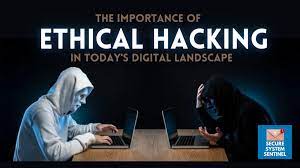Ethical hacking, also known as penetration testing or white-hat hacking, plays a crucial role in cybersecurity by identifying vulnerabilities and weaknesses in computer systems and networks before malicious hackers can exploit them. Ethical hackers, authorized professionals who simulate cyber attacks to uncover security flaws, help organizations strengthen their defenses and protect sensitive information from cyber threats. In this article, we explore the importance of ethical hacking in cybersecurity and its role in safeguarding digital assets and infrastructure.
Introduction to Ethical Hacking
Ethical hacking involves the authorized testing of computer systems and networks to identify security vulnerabilities and weaknesses. Ethical hackers, often employed by organizations or hired as independent consultants, use the same techniques and tools as malicious hackers to assess the security posture of systems and networks. However, ethical hacking is conducted with the permission of the system owner and aims to improve security rather than exploit vulnerabilities for malicious purposes.
Understanding the Role of Ethical Hackers
Ethical hackers play a critical role in helping organizations identify and address security risks before they can be exploited by malicious actors. By conducting controlled penetration tests and security assessments, ethical hackers help organizations identify vulnerabilities, assess the effectiveness of existing security controls, and prioritize remediation efforts. Ethical hackers adhere to strict ethical and legal guidelines and operate with the highest standards of professionalism and integrity.
Identifying Vulnerabilities and Weaknesses
Ethical hackers use a variety of techniques and tools to identify vulnerabilities and weaknesses in computer systems and networks. These may include conducting network scans, analyzing software code for security flaws, and exploiting misconfigurations or human errors. Proactive vulnerability assessment and penetration testing are essential components of a comprehensive cybersecurity strategy, enabling organizations to identify and address security gaps before they can be exploited by malicious attackers.
Mitigating Security Risks and Threats
Once vulnerabilities and weaknesses are identified through ethical hacking assessments, organizations can take proactive steps to mitigate security risks and threats. This may involve implementing security controls such as firewalls, intrusion detection systems, and encryption protocols to prevent unauthorized access and data breaches. Regular security updates and patches, employee training on cybersecurity best practices, and incident response plans are also essential for maintaining a robust security posture.
Enhancing Cybersecurity Posture
Ethical hacking plays a crucial role in enhancing the overall cybersecurity posture of organizations by identifying and addressing security vulnerabilities and weaknesses. By proactively identifying and remediating security risks, organizations can reduce the likelihood of successful cyber attacks and minimize the impact of security incidents on their operations and reputation. Incorporating ethical hacking into cybersecurity risk management frameworks helps organizations stay ahead of emerging threats and vulnerabilities.
Compliance and Regulatory Requirements
Ethical hacking activities must comply with legal and ethical guidelines, as well as regulatory requirements governing cybersecurity and data protection. Organizations conducting ethical hacking assessments and audits must ensure compliance with applicable laws and regulations, such as data privacy laws and industry-specific security standards. Adhering to ethical and legal principles is essential for maintaining the trust and confidence of stakeholders and avoiding potential legal and reputational risks.
Building Trust and Confidence
Ethical hacking practices help organizations build trust and confidence with stakeholders, including customers, partners, and regulators. By demonstrating a commitment to cybersecurity and data protection, organizations can reassure stakeholders that their sensitive information is being safeguarded against cyber threats. Transparent and ethical hacking practices help organizations foster a culture of security awareness and accountability, strengthening relationships with stakeholders and enhancing brand reputation.
Ethical Hacking Training and Certification
Training and certification are essential for aspiring ethical hackers to develop the skills and expertise needed to conduct ethical hacking assessments effectively. Popular ethical hacking certifications, such as Certified Ethical Hacker (CEH) and Offensive Security Certified Professional (OSCP), provide comprehensive training and assessment programs that cover a wide range of cybersecurity topics and techniques. By investing in training and certification for their cybersecurity professionals, organizations can ensure that they have the knowledge and capabilities needed to protect against evolving cyber threats.
Ethical Hacking in Emerging Technologies
Ethical hacking is particularly important in securing emerging technologies such as cloud computing, Internet of Things (IoT), and artificial intelligence (AI). As these technologies become increasingly integrated into business operations, they also introduce new security risks and challenges. Ethical hackers play a vital role in identifying and addressing security vulnerabilities in emerging technologies, helping organizations leverage the benefits of innovation while minimizing the associated risks.
Conclusion
In conclusion, ethical hacking is a critical component of modern cybersecurity practices, helping organizations identify and address security vulnerabilities before they can be exploited by malicious actors. By conducting controlled penetration tests and security assessments, ethical hackers help organizations strengthen their defenses, protect sensitive information, and maintain trust and confidence with stakeholders. Embracing ethical hacking as a proactive approach to cybersecurity enables organizations to stay ahead of emerging threats, safeguard digital assets and infrastructure, and achieve their business objectives in an increasingly interconnected and digital world.
